Waking Up at Night Again: Is My Baby Too Hungry After Starting Solid Foods?
- What age most babies are when they no longer need to feed in the middle of the night
- How to change your feeding schedule to promote longer night sleeps
- Which foods to avoid right before bedtime that can disrupt sleep
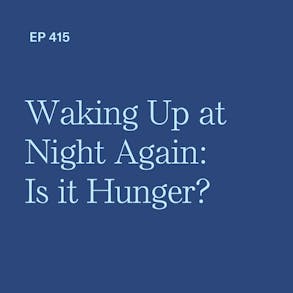
LISTEN TO THIS EPISODE
Episode Description
Is your baby waking up in the middle of the night again since you started solid foods? Does this mean the baby is hungry or not getting enough? In this episode we’re looking at solid food and sleep schedules to help you and your baby get a good night’s sleep after you start solid foods.
Links from this Episode
- Baby-Led Weaning with Katie Ferraro program with the 100 First Foods™ Daily Meal Plan, join here: https://babyledweaning.co/program
- Baby-Led Weaning for Beginners free online workshop with 100 First Foods™ list to all attendees, register here: https://babyledweaning.co/baby-led-weaning-for-beginners
Other Episode Related to this Topic
- Episode 55 - How to Drop a Milk Feed
- Episode 146 - Setting Your Baby's Sleep Schedule when Starting Solids with Aubrie DeBear, PsyD

Latest Episodes
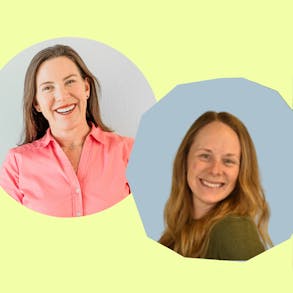
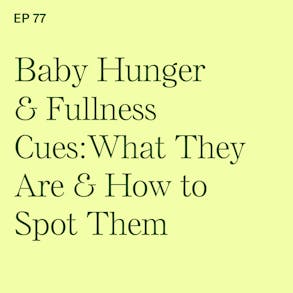
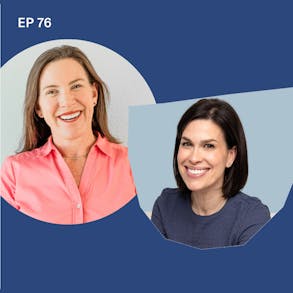
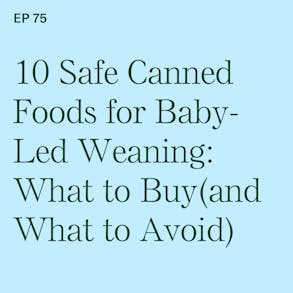
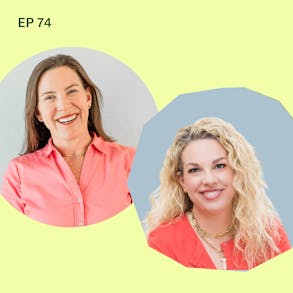
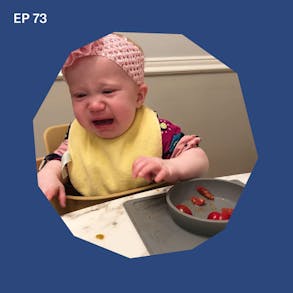
0 (2m 24s):
So your baby who's in phase two or three of Baby-Led Weaning between eight and 12 months of age, they're gonna be sleeping somewhere between 10 to 12 hours at night, and no, you do not need to offer them nutrition or sustenance in the middle of the night. And I know for some parents, that's really alarming. Wait a minute. I thought I had to wake them up in the middle of the night and feed them multiple times you did when they were little teeny tiny babies. But at this point, the rate of growth while they're still growing rapidly has slowed down. And you don't need to wake them. They don't need that sustenance in the middle of the night. But if they're waking up after you started solid foods and you're like, wait a minute, what happened? The sleep schedule's all off. Let's take a look at the timing of the infant milk, particularly the bedtime bottle or breastfeeding session Hey there, I'm Katie Ferraro, Registered dietitian, college nutrition professor and mom of seven specializing in Baby-Led Weaning.
0 (3m 14s):
Here on the Baby-Led Weaning with Katie Ferraro podcast. I help you strip out all of the noise and nonsense about feeding, giving you the confidence and knowledge you need to give your baby a safe start to solid foods using Baby-Led Weaning. When your baby starts solid foods, is it going to mess their sleep schedule up. A mom in my program recently asked, and this is a quote since we started solid foods two months ago, my baby is starting to nurse less, but she's not eating a ton of food yet. She's waking up in the middle of the night again and I'm worried that she's hungry. So, in this episode, I want to talk a little bit about this idea of overnight hunger and whether weaning off of infant milk is actually causing your baby to be hungry in the middle of the night.
0 (4m 2s):
I like to start off these solo training episodes with a Baby-Led Weaning tip of the day. And today's tip is to please be wary of sleep experts who are educating you about feeding. Now, I'm incredibly biased because I'm saying this to you as a Registered dietitian who specializes in infant feeding. I have a Registered dietitian nutrition credential. I'm a college nutrition professor. I have a Master's in Public Health Advanced Training and Pediatric food allergies. Feeding is my thing, but I'm also a mom. I have seven children, including two sets of multiples, quadruplets and twins and it wasn't until I had my own kids and was raising them in this era of social media and information overload that I was exposed to all of the opinions and pseudoscience that constitute the world of "sleep science", your sleep, your baby's sleep.
0 (4m 52s):
It is all very important. And I've tried to cover sleep respectfully on this podcast. However, I've also interviewed a number of self-proclaimed sleep experts who give outrageous advice about infant feeding. I've actually had two separate interviews by two separate "experts" that I could not air because the information that they were saying about feeding was so off base, completely fabricated, and even downright dangerous. We had, I remember one sleep lady from the internet told me with a straight face in a video interview that babies need more tryptophan containing foods like Turkey to help them to get to sleep through the night. Now, maybe she didn't know that I was a dietitian, but literally the link between dietary tryptophan from foods and sleep has been so thoroughly discounted that I couldn't believe what I was hearing.
0 (5m 39s):
So I get a little sensitive about sleep recommendations because I know that every baby is different and there are no hard and fast rules about how much or how often your baby should sleep. And yes, different programs are out there that can help get your baby to be on a particular sleep routine. But if you don't follow those regimens or those protocols, it's not to say that your baby is never going to sleep through the night. So In this episode. I wanna explore this idea of food related to sleep because of parental concerns about babies starting to wake up in the night after they start solid foods. And the concern is always is my baby hungry? Now, the sleep recommendations that I'm going to reference today are informed by the American Academy of Pediatrics.
0 (6m 23s):
I've personally and professionally found the AAP guidelines about sleep to be very reasonable and rational. Not to mention they're a lot simpler and more straightforward than some of the recommendations that you guys are hearing and seeing from people online who are not physicians. And frankly, do benefit from your overwhelm and your confusion and your sleep deprivation and hope that you'll buy their sleep program. So, having said that, let's take a look at the relationship between sleep and then kind of time that to where your baby is with regards to starting solid foods. Let's start at four to six months of age. The AAP maintains that by four to six months of age, a baby will likely no longer need to feed in the middle of the night.
0 (7m 5s):
Now, I can just hear moms from every corner of the internet. That's not true. At four months of age, my baby still slept through the night, my first baby fell asleep, and everyone's comparing everyone's baby to each other. But look at the range that we're talking about there. Four to six months of age at four, five, and even six months of age. Well, certainly four and five months of age. Your baby's not eating anything except infant milk, right? The AAP, the World Health Organization. Almost all major health bodies at this point recommend exclusive breastfeeding for the first six months of life. Okay? As a nutrition professional, breastfeeding professionals, we all agree breast milk and or formula is sufficient to meet your babies for the first six months of life. So between four to six months of life, whether your baby is sleeping through the night or not with regards to solid food, it really doesn't matter because your baby shouldn't be starting solid foods prior to six months of age.
0 (7m 53s):
Babies don't need anything from a nutritional standpoint. Plus physiologically your baby's not sitting on their own, which means they have not yet demonstrated that they have the trunk strength and the head and neck control to support a safe swallow. So four to six months of age, if you're working on getting your baby to sleep through the night, good for you. But don't worry about timing solid food feeds because it doesn't have any impact. 'Cause your baby shouldn't be starting solid foods yet. What does the AAP recommend about sleep at that age? Be consistent with your bedtime routine. Get your baby to a point where you're working towards self-soothing at night recommendations to keep the room dark and quiet. And the baby should be getting regular feeds during the day. Now of course, it goes without saying that any baby who's being deprived of food at regular intervals throughout the day is very unlikely to be sleeping through the night.
0 (9m 60s):
Now the AAP also says that by about three months of age, most babies sleep six to eight hours during the night. Any of us who've had an infant or has an infant right now knows that that can vary greatly. Some babies sleep through the night at six weeks. For some it's three months. For some it's six months. Everyone knows babies are different, okay? And six to eight hours during the night might not be enough for you to be sleeping through the night, and you certainly may be waking up to feed your baby in the middle of the night at the three month mark. But again, this has nothing to do with solid foods because your baby is drinking infant milk at that point. Now, by four to seven months of age, we're starting to cross into that area. If we cross over the seven month mark that your baby will start to be eating solid foods.
0 (10m 42s):
But as you know, the amount of food that your baby eats at six and seven months of age is almost inconsequential, right? It doesn't provide adequate nutrition to replace infant milk. Breast milk or formula is still providing most of the nutrition that your baby needs at that stage. And you're four to seven month old baby, they're probably still taking three naps a day in many cases. Some will start to go down to two and you'll drop that late afternoon nap somewhere around the seven month mark in certain situations. But what happens is, as you reduce the amount of time that the baby is sleeping in the day they begin to sleep for extended periods at night, okay? So that's why most parents will say, gosh, you know, my baby is normally sleeping through the night before we start solid foods.
0 (11m 24s):
And that's generally what we see, but it's not a prerequisite, okay? You don't have to have a baby sleeping through the night before you start solid foods. Keeping in mind that we don't wake a baby up in the middle of the night at six or seven months of age to eat solid food. And I'm kind of snickering when I say that, but I actually did have a mom in my program who was like, I'm so confused at three months I was having to wake up in the middle of the night to feed my baby infant milk. So now that we started solid foods, wouldn't I wake up in the middle of the night and feed the baby solid food? No, absolutely not. Okay. Only in the case of like some very unusual, you know, medical nutrition therapy situations. Would a child need to be awoken at night or fed solid food in the middle of the night?
0 (12m 4s):
Okay, your neurotypical child who's six, seven months of age doesn't need to eat solid food, certainly in the middle of the night, but might still be waking up to have infant milk. And remember, infant milk continues to provide most of your baby's nutrition even after you start solid foods. Now, at eight to 12 months of age, most eight month old babies are taking about two naps a day, a mid-morning, and a mid-afternoon nap. If you look at eight month old babies, they have the potential to sleep between 10 and 12 hours at night. And the AAP adds on that, these babies at eight months of age do not need night feeds. Now, are you providing night feeds? If you want to, if that works for you. If you just love waking up and breastfeeding twice in the middle of the night, you certainly can.
0 (12m 45s):
I work with a lot of parents who, when we look at their feeding schedule, including both infant milk and solid food schedule, the infant milk schedule at eight months of age looks exactly as the same as it did at three months of age. And, that is not ideal, okay? By eight months of age, if your baby's been eating solid foods for about eight weeks, is generally the time that we start dropping a milk feed, okay? And the goal here is your baby's just starting to get the skillset where they can start using food to help alleviate or relieve that feeling of hunger. They're not super proficient at it, okay? It's not for a few more weeks or months. Usually our 10 month old babies, they're the ones who, if they can start, they're feeling a little bit of what I call casual hunger. They have this skillset, if they've been eating solid foods for about four months to actually utilize that food to help alleviate those feelings of casual hunger.
0 (13m 32s):
We never wanna "starve your baby out", but bringing an older baby who's a little bit hungry to the table, okay? That's a good thing. And a lot of the parents I hear from are so scared to let their children feel hungry. They're trying to feed them at all hours of the day and night so that they're never hungry, okay? That's not the goal. We want to get to a place that by one year of age, the baby's meal plan is pretty much mimicking what we see with the rest of the family. And a lot of families that's eating three solid meals a day, the infant milk that they're having in between meals is their snack. If you have to stretch those meals out, the baby might benefit from having a snack. But for the most part, three meals a day, milk in between meals is sufficient to meet your baby's needs at 12 months of age.
0 (14m 12s):
But back to the sleeping, we've got our eight month old who's generally gonna sleep around 10 to 12 hours a night and will not need night feeding. Sometimes the families we work with when they're baby's just starting to get the hang of solid foods, like it's all starting to click somewhere between eight and 12 weeks after starting solid foods. The mom will say, oh my gosh, they're starting to eat a little bit more, but I'm still worried it's not enough. And now they're not breastfeeding as much if they wake up in the middle of the night, is it because they're hungry? And my suggestion to you is that, especially in the weaning period, forever concerned about baby, "not getting enough" step back and remind yourself it's not your job to make your baby eat. You are in charge of what the baby eats and where they eat and when they eat. And so some of this has to do with timing and switching around the milk and the solid food schedule.
0 (14m 57s):
You should never have to wake up in the middle of the night to feed your baby food. Some parents will say, should I move the solid food at night? Like we're doing dinner at five o'clock, but they don't go to bed until seven or eight. Should I move that dinner until later? No, not necessarily. If, if five o'clock is the time that works for you to do dinner, keep in mind that at, you know, eight months of age for most babies, not even half of their nutrition is coming from food yet, I would advise you to work on the milk schedule, okay? I don't recommend dropping the bedtime bottle feed or the bedtime breastfeeding session until the very, very, very last milk feed that you drop. My suggestion is always to drop the morning feed first. And I have a whole podcast episode that we did that was all about How to Drop a Milk Feed.
0 (15m 37s):
So this is something that we generally start doing around the eight month mark. If you wanna listen to that, if you go back to episode 55, it's called How to Drop a Milk Feed blwpodcast.com/55 for more info on why I think the morning feed, if you're not tied to one or the other, I think the morning feed is always the best one to start with. And I, hold on to that bedtime feed until the very end again, because I, I know that baby is still getting slightly more than half of their nutrition from infant milk at the eight month mark.
0 (16m 45s):
Now as you move into phase two of Baby-Led Weaning, which is the second eight weeks, so this is generally our eight and our nine, sometimes 10-month old babies. This is what I call the golden age of Baby-Led Weaning. This is when your baby really starts to get the hang of it and then they're picking up foods and they're bringing it to their mouth and you're like, oh my gosh, they're actually chewing it and swallowing some of it. And you'll notice that your baby starts wanting to drink less infant milk and parents worry, oh my gosh, the baby's getting bigger, the diaper size is getting bigger, the clothes size is getting bigger, shouldn't the amount of milk that they drink get bigger? And the answer is no. You kind of tap out or peak out somewhere around the eight or nine month mark with regards to the volume of breast milk or formula that the baby will drink.
0 (17m 25s):
And this makes perfect sense, right? Because the weaning period is all about helping your baby get more nutrition from food and less nutrition from milk. And they're gonna turn that corner somewhere around the nine, 10-month mark where the food intake is really going up and the milk intake is going down And that is weaning in action at the same time your baby is dropping a nap. So you're consolidating the sleep, okay, that they need cumulatively in a 24 hours. More of it starts happening at nighttime and less of it starts happening in the daytime. Okay? So your baby's gonna be sleeping through the night with generally around two naps, and then it'll probably drop down to one nap somewhere shortly before the first birthday. Okay? Your baby's gonna be moving a little bit more, right?
0 (18m 7s):
They're crawling more and they're pulling up, they're getting tired, but they get tired earlier in the evening and they're gonna actually start going to bed earlier and sleeping for longer. Do you need to provide a bedtime solid food snack to help them get through the night? No, certainly not. Do your breakfast, do your lunch, do your dinner. Okay? Most families I work with, they'll do their dinner around five or six o'clock, okay? Bedtime routine is around seven or eight o'clock. And as long as you're still offering infant milk, be that from breastfeeding or bottle feeding, continue that night. Milk feed, okay? It's a bonding session between you and the baby, but it's also providing a small amount of nutrition, okay? That will help them get through the night. But your baby at 10, 11, 12 months of age does not need to be waking up in the middle of the night and eating multiple times a day, okay?
0 (18m 50s):
They might be conditioned to wake up and if they cry for you and you come get them, like that's a whole different story. And, and yes, work on your own sleep schedule that works for your family, but please don't feel obligated to wake up a 10, 11, or 12-month old baby or to need to feed them in the middle of the night because physiologically, they've developed so much more since when they were a little tiny baby and you did have to feed them multiple times in the middle of the night. The other thing I wanna leave you with is the reminder that as your baby approaches the one year mark, the rate of growth slows down. So you'll think like, how can this big baby possibly make it through the night with no new food in their stomach because the rate of growth is slowing down. They don't require as much energy, just nutrition and calories from infant milk or from food per kilogram or pound of their body weight as they did in the earlier stages of infancy.
0 (19m 38s):
So even though your beautiful baby is getting bigger and getting closer to being a toddler, that rate of growth is slowing down and the amount of food that you're offering them in the day is sufficient. You shouldn't have to wake up in the middle of the night and feed them. I hope you found some of that information helpful. If you are stressing about sleep schedules, please know it's very typical and it's hard because our babies don't develop into a vacuum, right? They don't learn how to eat solid foods independent of needing to change their sleep schedule. And you're not perfecting your sleep schedule independent of also having to work on introducing new foods. But please know that not all babies are the same. What works for one family or in one program might not work for you. You know your baby best, but you are not starving your baby out if you don't let them eat food in the middle of the night as an older infant.
0 (20m 19s):
I'll put a link to some of the resources from today's episode on the Shownotes page, which you can find at blwpodcast.com/415. A special thank you to our partners at AirWave Media. If you like podcasts that feature food and science and using your brain, check out some of the podcasts from AirWave Media. We're online at BLWpodcast.com. Thanks so much for listening. Happy Feeding and also happy sleeping. Enjoy that full night's sleep. That's coming soon. If you haven't already achieved it yet, hang in there. You're doing a great job.

The Program Baby-Led Weaning with Katie Ferraro
A step-by-step digital program for starting solid foods safely and navigating the original 100 FIRST FOODS™ meal plan with baby-led weaning.
 EXPERT-LED, PROVEN APPROACH TO EATING REAL FOOD
EXPERT-LED, PROVEN APPROACH TO EATING REAL FOOD CONCISE VIDEO TRAININGS TO MASTER BABY-LED WEANING
CONCISE VIDEO TRAININGS TO MASTER BABY-LED WEANING 100 FIRST FOODS DAILY MEAL PLAN WITH FOOD PREP VIDEOS
100 FIRST FOODS DAILY MEAL PLAN WITH FOOD PREP VIDEOS
Baby-Led Weaning for Beginners Free Workshop
Is your baby ready to start solid foods, but you’re not sure where to start? Get ready to give your baby a solid foundation to a lifetime of loving real food…even if you’re feeling overwhelmed or confused about this next stage of infant feeding.
Get baby-led weaning recipes and tips delivered to your email inbox.

